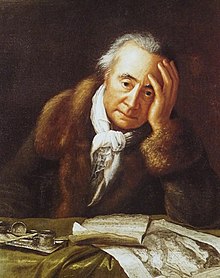Ulysses von Salis-Marschlins
Baron Ulysses von Salis-Marschlins (born August 25, 1728 in Igis ; † October 6, 1800 in Vienna ) was the most influential Graubünden politician in the second half of the 18th century and carried out reform work in the field of journalism, economics and education.
Due to their wealth and influence, the extensive von Salis family under the leadership of Ulysses von Salis-Marschlins played a central role in the political and economic life of the Three Leagues in the second half of the 18th century . Von Salis campaigned to defend the privileges of families and was heavily involved in advancing education and agriculture.
Life
Ulysses von Salis-Marschlins was the son of Johann Gubert Rudolf and Perpetua von Salis-Soglio. He spent his youth in Chiavenna and Soglio ; he was taught privately. After a few educational trips and a long stay in Holland, he studied law at the University of Basel from 1745–1746 .
From 1755 he published historical, political and economic writings that were committed to conservative aristocratic-patriotic ideas. He wrote his first pamphlet on the rights of the church association at the Chur monastery . The legal work was often legal opinions on disputes in the Three Leagues and their sovereignty rights in the subject countries.
In 1749 von Salis held an official position bought for him for the first time in the court of the four villages , where he later also became Landammann. From 1757 to 1759 he was Podestà in Tirano in Valtellina, where the family owned goods. He succeeded in persuading the various branches of the Salis families to adopt a unified approach, to build up family rule, and thereby undermine the power of the previously ruling Austrian party in Bünden.
After 1759, von Salis' attempt to introduce cotton spinning into the publishing system failed . The attempt to plant tobacco in Marschlins and to raise silkworms also failed. In 1761 he accompanied an embassy to Milan as a steward for the renewal of the Milan capitulate , which among other things had a clearing of the borders between the areas of Milan and Bünden and other favorable consequences for Bünden.
In 1763 von Salis supported the opening of the so-called seminar in Haldenstein Castle , which was relocated to Marschlins in 1771. After the death of the founder, Martin Planta, he temporarily took over the educational management of the institute and in October 1775 converted the school into the second Philanthropinum based on the principles of Johann Bernhard Basedow . In February 1777 he had to close the institute for financial reasons. In 1770 and 1771 von Salis was a member and president of the Helvetic Society .
From 1774 to 1792 Salis was France's chargé d'affaires with the Three Leagues. He lost the post presumably at the instigation of the Graubünden opposition party, the "Patriots", which had formed in the mid-1780s under the leadership of Johann Baptista von Tscharners with the aim of limiting the steadily growing power of von Salis. Now these gained the upper hand in Bunds; At the general professional assembly in Chur in 1794, the storm was directed against him personally. Von Salis was declared outlawed and banned, and his goods were confiscated. In addition, the connection of the Valtellina to the Cisalpine Republic led to the loss of goods in the Valtellina. In his country estate Eckbühl near Höngg (today in Zurich), which he had bought as a retirement home for a quiet retirement, he agitated against the Graubünden "patriots" and the annexation of Graubünden to the Helvetic Republic . Soon he sought refuge in St. Gallen, soon again in Zurich, where he was driven out again by the penetration of the French. Finally he dared to return to Marschlins, but fled in the summer of 1800 when the French were advancing into Tyrol and on to Vienna. Already on the trip he fell into a nervous fever; and died five days after his arrival in Vienna on October 6, 1800.
The oldest (not consistently exact) biographical sketch of Ulysses von Salis-Marschlins can be found in the text «Denkmal der kindl. Awe built by s. Daughters ”, Zurich 1801. The main biographical source is the “ preliminary report ”of the 3rd volume of the“ Picture Gallery ”, Winterthur 1802, written by his son, the naturalist Carl Ulysses
Ulysses von Salis had been married to Barbara Nicolea von Rosenroll from the Thusner forwarding company since 1751 .
literature
- Constantin von Wurzbach : Salis, Karl Ulysses von . In: Biographisches Lexikon des Kaiserthums Oesterreich . 28th part. Imperial-Royal Court and State Printing Office, Vienna 1874, p. 113 f. ( Digitized version ).
- Georg von Wyß: Salis, Herkules von . In: Allgemeine Deutsche Biographie (ADB). Volume 30, Duncker & Humblot, Leipzig 1890, pp. 233-240.
- Metz, Peter: Ulysses von Salis-Marschlins, . Calven, Chur 2000, ISBN 3-905261-22-7 .
- Ulysses von Salis-Marschlins. A ruler of the old covenant. In: Bündner Jahrbuch: Zeitschrift für Kunst, Kultur und Geschichte Graubünden, Vol. 43, 2001, pp. 58–60 ( digitized version ).
- Peter Metz Senior: 200 years ago. The downfall of the Free State of more common three leagues. Bündner Jahrbuch: Journal for Art, Culture and History of Graubünden, Vol. 43, 2001, pp. 62–70 ( digitized version ).
Web links
- Jürg Simonett: Salis, Ulysses von (Marschlins). In: Historical Lexicon of Switzerland .
- Karin Marti-Weissenbach: Salis, Karl Ulysses von (Marschlins). In: Historical Lexicon of Switzerland .
- Ancestral info
- Ulysses von Salis-Marschlins. In: WorldCat
Individual evidence
| personal data | |
|---|---|
| SURNAME | Salis-Marschlins, Ulysses von |
| BRIEF DESCRIPTION | Graubünden politicians and entrepreneurs |
| DATE OF BIRTH | August 25, 1728 |
| PLACE OF BIRTH | Igis |
| DATE OF DEATH | October 6, 1800 |
| Place of death | Vienna |

